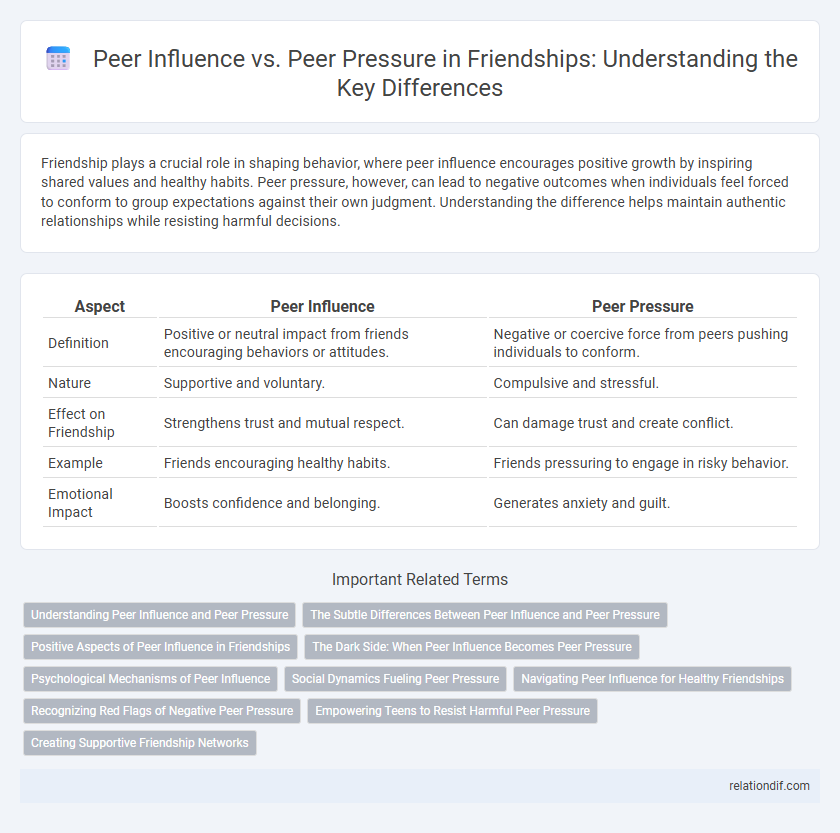Friendship plays a crucial role in shaping behavior, where peer influence encourages positive growth by inspiring shared values and healthy habits. Peer pressure, however, can lead to negative outcomes when individuals feel forced to conform to group expectations against their own judgment. Understanding the difference helps maintain authentic relationships while resisting harmful decisions.
Table of Comparison
| Aspect | Peer Influence | Peer Pressure |
|---|---|---|
| Definition | Positive or neutral impact from friends encouraging behaviors or attitudes. | Negative or coercive force from peers pushing individuals to conform. |
| Nature | Supportive and voluntary. | Compulsive and stressful. |
| Effect on Friendship | Strengthens trust and mutual respect. | Can damage trust and create conflict. |
| Example | Friends encouraging healthy habits. | Friends pressuring to engage in risky behavior. |
| Emotional Impact | Boosts confidence and belonging. | Generates anxiety and guilt. |
Understanding Peer Influence and Peer Pressure
Peer influence involves friends shaping attitudes and behaviors through positive or neutral interactions, often encouraging growth and healthy choices. Peer pressure occurs when individuals feel compelled to conform to group expectations, sometimes leading to risky or harmful actions. Differentiating these dynamics is crucial for fostering supportive friendships that promote well-being and personal development.
The Subtle Differences Between Peer Influence and Peer Pressure
Peer influence involves the natural and often positive impact friends have on shaping attitudes, behaviors, and decision-making, fostering growth and social learning. Peer pressure, however, implies a more forceful or coercive dynamic where individuals feel compelled to conform to group expectations, sometimes against their own values. Understanding these subtle differences helps in promoting healthy relationships while recognizing when boundaries are being compromised.
Positive Aspects of Peer Influence in Friendships
Peer influence in friendships fosters personal growth by encouraging positive behaviors such as academic achievement, healthy habits, and emotional support. Friends who demonstrate empathy, resilience, and constructive communication skills create an environment that nurtures self-confidence and mutual respect. This positive peer dynamic enhances social development and contributes to overall well-being by reinforcing shared values and constructive decision-making.
The Dark Side: When Peer Influence Becomes Peer Pressure
Peer influence shapes behavior through subtle encouragement and shared values, while peer pressure involves coercive tactics that challenge individual autonomy. The dark side emerges when peer pressure overrides personal judgment, leading to risky decisions such as substance abuse or unethical actions. Understanding this distinction is crucial for fostering healthy friendships that support positive growth rather than conformity.
Psychological Mechanisms of Peer Influence
Peer influence operates through psychological mechanisms such as social learning, conformity, and the desire for social acceptance, shaping behavior by modeling and reinforcing norms within a friendship group. Mirror neurons play a key role, enabling individuals to empathize and imitate peers, which strengthens social bonds and internalizes group values. Unlike peer pressure, which often involves coercion, peer influence subtly guides decision-making by activating intrinsic motivation to align with peers' attitudes and behaviors.
Social Dynamics Fueling Peer Pressure
Social dynamics such as the desire for acceptance and group conformity significantly fuel peer pressure, often blurring the line between healthy peer influence and coercive behavior. Peer influence typically shapes positive behaviors by fostering support and shared values within a friendship, whereas peer pressure can manipulate decisions through fear of rejection or social exclusion. Understanding these social forces is essential for promoting autonomy while maintaining strong, supportive peer connections.
Navigating Peer Influence for Healthy Friendships
Peer influence plays a crucial role in shaping behaviors and attitudes within friendships, often encouraging positive growth and shared interests. Navigating peer influence involves recognizing supportive interactions that promote self-confidence and mutual respect while setting boundaries against negative peer pressure that may lead to harmful decisions. Cultivating awareness and effective communication strategies helps maintain healthy friendships grounded in trust and individuality.
Recognizing Red Flags of Negative Peer Pressure
Peer influence shapes behavior through encouragement and shared values, while peer pressure often involves coercion or manipulation that can lead to harmful decisions. Recognizing red flags of negative peer pressure includes feeling uncomfortable, being urged to break personal boundaries, or experiencing consistent manipulation to conform. Awareness of these signs helps maintain healthy friendships and supports making autonomous, positive choices.
Empowering Teens to Resist Harmful Peer Pressure
Empowering teens to resist harmful peer pressure involves teaching critical thinking skills and fostering self-confidence, enabling them to make independent, positive decisions despite external influences. Encouraging open communication and creating supportive social environments help teens distinguish between healthy peer influence and coercive pressure. By promoting resilience and emotional intelligence, adolescents develop the capacity to maintain authentic friendships that reinforce their values and well-being.
Creating Supportive Friendship Networks
Creating supportive friendship networks involves fostering peer influence that encourages positive behaviors, personal growth, and mutual respect among friends. Unlike peer pressure, which often leads to conformity through coercion or manipulation, peer influence in healthy friendships promotes encouragement, constructive feedback, and shared values. Developing such networks enhances emotional resilience, boosts self-esteem, and creates a safe environment for open communication and authentic connections.
Peer influence vs Peer pressure Infographic

 relationdif.com
relationdif.com